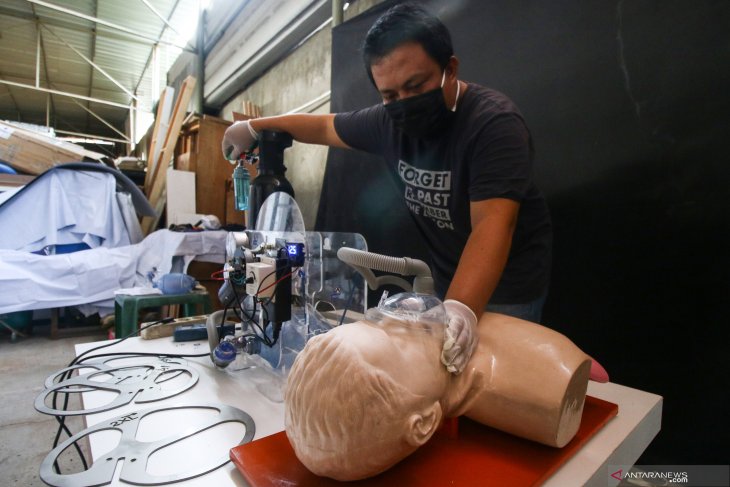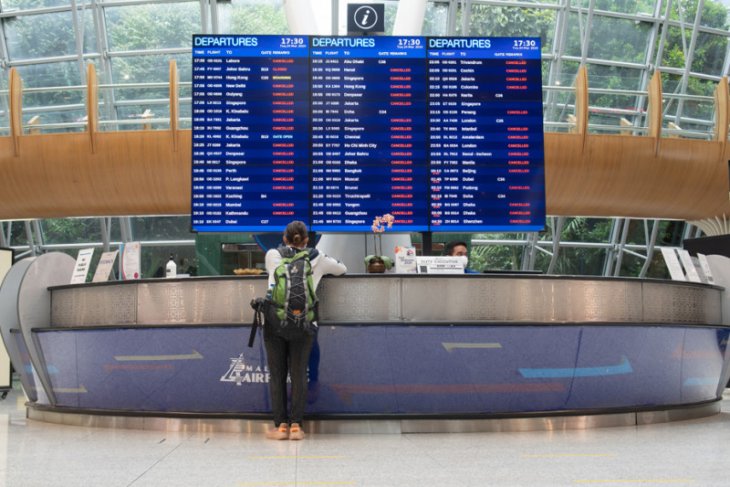Live Streaming
Program Highlight
Company Profile

Ani Hasanah
Pakistan Embassy in Jakarta Facilitates Repatriation of Stranded Pakistanis from Indonesia
Jakarta (VOI News) - Pakistan Embassy in Jakarta facilitated the repatriation of stranded Pakistanis due to flight cancellations amid the Covid-19 Pandemic outbreak.
A special Pakistan International Airlines (PIA) flight carrying 237 stranded Pakistanis, left Jakarta for Islamabad, Pakistan, Tuesday morning (19/05). Pakistan Ambassador to Indonesia, Abdul Salik Khan and a team of officers and staff from the Embassy were at the airport to bid farewell to the Pakistan nationals, who appreciated the efforts of the Mission in facilitating their stay as well as arranging the special flight enabling them to celebrate Eid ul Fitr with their loved ones. Press Release from the Pakistan Embassy received by Voice of Indonesia in Jakarta, Tuesday, said, with the concerted efforts of the Embassy, both Indonesian and Pakistan Ministry of Foreign Affairs and seamless coordination with the PIA authorities, almost all stranded Pakistanis have been able to return to Pakistan safe and sound. Before the Pakistani nationals, the ambassador appreciated their patience throughout this pandemic and remind them to follow all the health precautions.
"I appreciated your patience throughout this pandemic. This is the duty of the Embassy to take care of all Pakistanis and due to these efforts, almost all stranded Pakistanis have been repatriated to Pakistan from Indonesia. These efforts will continue. Please follow all the precautions such as wearing masks, using hand sanitizers, and observing social distancing during these difficult times," Ambassador Abdul Salik Khan said.
This was the second flight of repatriation of Pakistani nationals from Indonesia during the past five weeks. Earlier, on 18 April 2020, 221 Pakistanis had returned to Pakistan from Indonesia. Around 450 Pakistanis were stranded in different parts of Indonesia due to flight cancellations amid the Covid-19 Pandemic outbreak. (VOI/AHM/Release Pakistan Embassy)
ASEAN Countries’ Online Platforms to Tackle COVID-19
- Track & Trace suspected patients
- Checking crowd levels
- Social distancing reminder
- Bridging the support
Brunei
- CommunityForBrunei.com, a platform to donate necessities to medical staff and hospitals
Indonesia
- PeduliLindungi, an application to detect movement of suspected patients and report number of confirmed cases daily
Malaysia
- GERAK Malaysia, an application to collect data on users’ locations and record each place visited
- MySejahtera, a health self-assessment application
- MyTrace, a contact tracing application
Philippines
- ReliefAgad.ph, a website to expedite the delivery of relief assistance money to beneficiaries across the Philippines
Singapore
- TraceTogether, a community-driven contact tracing application
- SpaceOut.gov.sg, a website indicating real-time crowd levels shared by the malls
Thailand
- ThaiChana.com, a platform to monitor real-time crowd levels shared by retailers
- MorChana, a health self-assessment and contact tracing application
Vietnam
- NCOVI, an application where people voluntary share their health status online
- Bluezone, a contact tracing application
Infographic
ASEAN Division, Foreign Office, Thai PRD
Source
ASEAN Information Network
May

A craftsperson tests ventilators at the Agusta MSME industry in Jakarta on April 14, 2020. (ANTARA)
Deputy Minister of Trade, Jerry Sambuaga, is pushing the development of micro, small, and medium enterprises (MSMEs) with the help of technology giant Google through the provision of features that support the sector’s operations.
On Friday, May 15, 2020, the deputy minister held a virtual meeting with representatives from Google Indonesia.
At the meeting, Google Indonesia offered assistance to the Government of Indonesia, especially to the COVID-19 Task Force, for handling the coronavirus pandemic in the country.
In a statement received here on Monday, Sambuaga said the assistance could hugely contribute to efforts against COVID-19.
"In this (pandemic) condition, the role of information technology is very important to support the government, business, and community activities. The COVID-19 outbreak must be used as a reason to move towards a more digital economic transformation, in accordance with President Joko Widodo's mandate," he stated.
To achieve that, technological support would be a decisive factor, he added and expressed his appreciation towards Google for the assistance it has provided.
He said he has asked Google Indonesia to help the government hasten the spread and use of technology in eastern Indonesia.
The Deputy Minister stated that the potential in the eastern part of Indonesia needs to be fully utilized. That way, development in eastern Indonesia can progress as quickly as the western region, ensuring better welfare for the people, he explained.
"Eastern Indonesia must continue to be encouraged and also become a priority for development, in order to achieve optimal development of the region. The potential of the region must be reflected through the welfare of its citizens. With the help of Google Indonesia, we can increase the use of technology so that eastern Indonesia can move as fast (in terms of development) as the western region," he continued.
In response, Google Indonesia has committed to continue providing assistance, both for handling COVID-19 as well as for ongoing cooperation.
Furthermore, the Ministry of Trade and Google will hold a technical meeting to discuss follow-up steps. (ANTARA)
May
 APEC Illustration for travel and tourism industry. (HO-APEC Secretariat)
APEC Illustration for travel and tourism industry. (HO-APEC Secretariat)
Tourism officials from APEC’s member economies are intensifying cooperation to effectively mitigate the impacts of the COVID-19 pandemic on the tourism industry and pave the path to recovery.
At the APEC Tourism Working Group virtual meeting on Friday (May 15), attention was drawn to the significant impact of the pandemic on international travel and international tourist arrivals being set back by 58-78 percent in 2020.
"The tourism industry is the first sector to be affected by the COVID-19 pandemic and will be among the last ones to recover, as travelers become more conscious of the health risks and are discouraged by the stringent travel restrictions being implemented around the world," Senior Director of Tourism Policy and International Relations of Malaysia’s Ministry of Tourism, Arts, and Culture Muhammad Daud stated.
"We have to assume our role by consolidating our efforts in areas where we can support businesses and communities in the region," Daud stated as noted in a press release issued by the APEC Tourism Working Group and received here on Monday.
The Asia-Pacific region registered the highest growth in terms of tourist arrivals globally, with a total of 464.7 million international tourist arrivals in 2017, or some 33 percent of the global tourism arrivals. Going forward, this will no longer be the case.
"It will take a long time before confidence and trust in traveling again is restored among the people. Even if the situation were to improve, it would take a while for global travel to pick up the pace," Rebecca Sta Maria, APEC Secretariat’s executive director, noted in her remarks to officials.
"The tourism industry is the backbone for several of our small businesses, women, and vulnerable communities. We must fine-tune our approach to provide necessary support to people in our communities to navigate through these difficult times," she emphasized.
The travel and tourism sector employs 57.5 million people in the APEC region and contributes US$1.5 trillion to the global gross domestic product.
A total of 470 international airports in APEC economies facilitate business and leisure travel. The scale of the industry’s contribution to the economy makes it a crucial driver of growth for the region.
Work in promoting sustainable and inclusive tourism within APEC is ongoing, including aligning policies among member economies, facilitating travel, and streamlining coordination mechanisms.
Based on the current developments, the group is reviewing existing work plans and goals, including exploring the best-possible solutions to conform to the new normal within the tourism industry.
The group will also boost efforts to strengthen resilience in the tourism sector by incorporating risk and emergency management measures, increasing information flow for sharing best practices, and encouraging greater collaboration.
"Members are keen to open up the economy and revive the tourism sector. However, the health and safety of travelers are paramount. We need to work closely with our health and emergency preparedness agencies in developing standard procedures that will simultaneously instill confidence, encourage travel, and ensure safety," Daud emphasized. (ANTARA)



